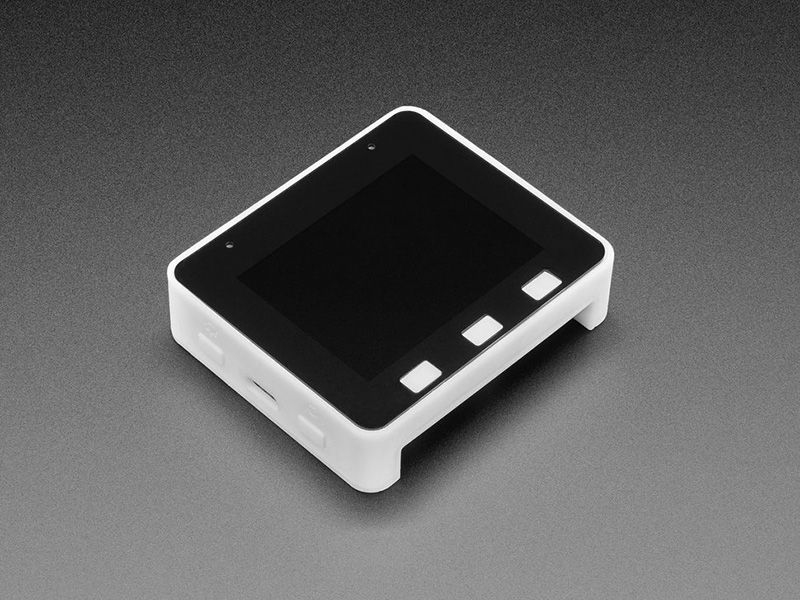
ESP32-S3 Box Lite by Espressif
The ESP-BOX is a new generation AIoT development platform released by Espressif Systems. The ESP32-S3-BOX is an AIoT development board that is based on Espressif’s ESP32-S3 Wi-Fi + Bluetooth 5 (LE) SoC. The ESP32-S3-BOX provides a platform for developing the control of home appliances using Voice Assistance + touch screen controller, sensor, infrared controller, and intelligent Wi-Fi gateway.
The Lite version is a little different than the non-Lite:
- Does not include the dock that serves as a stand for your device.
- Comes with 3 mechanical buttons instead of software buttons
- Does not support AEC or waking during speak/music playback
Full differences are documented here.** If you want the original S3-Box, check out this version.
The ESP32-S3-BOX Lite comes with pre-built firmware that supports offline voice interaction, with the SDKs and examples provided by Espressif, you will be able to develop a wide variety of AIoT applications based on the ESP32-S3-BOX Lite such as online and offline voice assistants, voice-enabled devices, HMI touch-screen devices, control panels, multi-protocol gateways easily.
ESP-BOX Lite features:
- Supports far-field voice interaction with 2 mics
- Offline voice wake-up with high wake-up rate
- Offline speech commands recognition in Chinese and English languages with high recognition rate
- Reconfigurable voice commands in Chinese and English languages
- Flexible and reusable GUI framework
- End-to-end IoT development framework ESP-RainMaker
-
Pmod™ compatible headers support expand peripheral modules
- For getting started with ESP32-S3-BOX, Please refer to the Getting Started
- For voice control and customization, please refer to the Voice Assistance Control and Customization
- For controlling the device by graphical user interface, please refer to the GUI Guide
- For more details of ESP32-S3-BOX hardware, Please refer to ESP32-S3-BOX hardware overview
- For the latest version firmware, Please refer to the ESP32-S3-BOX firmware update
Important Note: We recommend updating the ESP32-S3-BOX firmware when you first receive the kit to have the latest features and bugfix. Current firmware support is though ESP-IDF (not Arduino yet)
Purchase
Contribute
Have some info to add for this board? Edit the source for this page here.
CircuitPython 9.2.8
This is the latest stable release of CircuitPython that will work with the ESP32-S3 Box Lite. Use this release if you are new to CircuitPython.
Modules included in this download
_asyncio _bleio _eve _pixelmap adafruit_bus_device adafruit_pixelbuf aesio alarm analogbufio analogio array atexit audiobusio audiocore audiomixer audiomp3 binascii bitbangio bitmapfilter bitmaptools board builtins builtins.pow3 busdisplay busio busio.SPI busio.UART canio codeop collections countio digitalio displayio dualbank epaperdisplay errno espidf espnow espulp fontio fourwire framebufferio frequencyio getpass gifio hashlib i2cdisplaybus io ipaddress jpegio json keypad keypad.KeyMatrix keypad.Keys keypad.ShiftRegisterKeys keypad_demux keypad_demux.DemuxKeyMatrix locale math max3421e mdns memorymap microcontroller msgpack neopixel_write nvm onewireio os os.getenv paralleldisplaybus ps2io pulseio pwmio rainbowio random re rgbmatrix rotaryio rtc sdcardio sdioio select sharpdisplay socketpool socketpool.socketpool.AF_INET6 ssl storage struct supervisor synthio sys terminalio tilepalettemapper time touchio traceback ulab usb usb_cdc usb_hid usb_midi vectorio warnings watchdog wifi zlibFeatures: Wi-Fi, Bluetooth/BTLE, Breadboard-Friendly, Display, Speaker
CircuitPython 10.0.0-alpha.7
This is the latest development release of CircuitPython that will work with the ESP32-S3 Box Lite.
Alpha development releases are early releases. They are unfinished, are likely to have bugs, and the features they provide may change. Beta releases may have some bugs and unfinished features, but should be suitable for many uses. A Release Candidate (rc) release is considered done and will become the next stable release, assuming no further issues are found.
Please try alpha, beta, and rc releases if you are able. Your testing is invaluable: it helps us uncover and find issues quickly.
Release Notes for 10.0.0-alpha.7
Modules included in this download
_asyncio _bleio _bleio (native) _eve _pixelmap adafruit_bus_device adafruit_pixelbuf aesio alarm analogbufio analogio array atexit audiobusio audiocore audiomixer audiomp3 binascii bitbangio bitmapfilter bitmaptools board builtins builtins.pow3 busdisplay busio busio.SPI busio.UART canio codeop collections countio digitalio displayio dualbank epaperdisplay errno espidf espnow espulp fontio fourwire framebufferio frequencyio getpass gifio hashlib i2cdisplaybus io ipaddress jpegio json keypad keypad.KeyMatrix keypad.Keys keypad.ShiftRegisterKeys keypad_demux keypad_demux.DemuxKeyMatrix locale lvfontio math max3421e mdns memorymap microcontroller msgpack neopixel_write nvm onewireio os os.getenv paralleldisplaybus ps2io pulseio pwmio rainbowio random re rgbmatrix rotaryio rtc sdcardio sdioio select sharpdisplay socketpool socketpool.socketpool.AF_INET6 ssl storage struct supervisor synthio sys terminalio tilepalettemapper time touchio traceback ulab usb usb_cdc usb_hid usb_midi vectorio warnings watchdog wifi zlibFeatures: Wi-Fi, Bluetooth/BTLE, Breadboard-Friendly, Display, Speaker
Absolute Newest
Every time we commit new code to CircuitPython we automatically build binaries for each board and language. The binaries are stored on Amazon S3, organized by board, and then by language. These releases are even newer than the development release listed above. Try them if you want the absolute latest and are feeling daring or want to see if a problem has been fixed.
Previous Versions of CircuitPython
All previous releases of CircuitPython are available for download from Amazon S3 through the button below. For very old releases, look in the OLD/ folder for each board. Release notes for each release are available at GitHub button below.
Older releases are useful for testing if you something appears to be broken in a newer release but used to work, or if you have older code that depends on features only available in an older release. Otherwise we recommend using the latest stable release.
